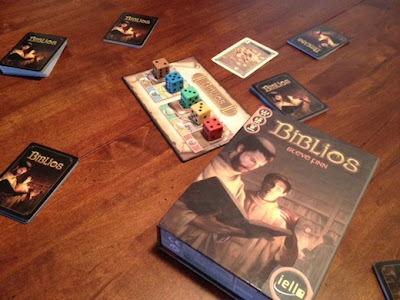Due to my interest in playing Biblios, I also wound up with an opportunity to play Scripts and Scribes: The Dice Game.
In Scripts and Scribes: The Dice Game, the goal is to get the most gold. Every turn, the active player will roll all of the dice (1 gold die, 5 resource dice, and 1 adjustment die). Then, depending on what is rolled on the gold die, various things might happen. In a "standard" turn (when a coin is rolled), players take turns selecting groups of matching dice and moving their token up on the corresponding resource track, gaining gold, or adjusting the end of game value of one of the resource tracks. If the gold die rolls an "auction for resources" then an auction begins, with the winner getting to use all of the dice - and then the active player rolls the dice again. The gold die can also roll an "auction for gold" in which the players bid how few gold coins that they are willing to accept to permanently remove a token from the game - then the active player re-rolls all the dice. Finally, the gold die might show a re-roll icon, which allows the active player to re-roll any or all of the resource dice, but must pay one more gold each time that he re-rolls a group of dice. Play continues until three scoring markers are at the top of resource groups, someone reaches the top of the abbot track (a resource track that's not worth points at the end of the game), or one player has removed four tokens. Then, whoever is winning each resource track gains gold equal to the value of that track (indicated by a die) times three, and second place gains the value of the track. Whoever has the most gold wins!
The first pro that I have for the Scripts & Scribes Dice Game is how the "auction for gold" works. Inevitably, you will have certain resources in which you are not going to be first or second place. So, why bother even keeping the token for this resource? The auction for gold lets you trade it in to at least make a few coins, since you knew you weren't going to make any otherwise. Of course, if the auction for gold is rolled early in the game, then you have to decide if you're willing to sacrifice a resource that you have a good chance to win in order to get extra gold. And, based on if this auction is rolled early or late in the game will adjust the value of your token - if you sacrifice it early in the game when you still have an opportunity to win any given resource, it might be worth 6 or more gold. Whereas, at the end of the game, when everyone has a token that they can sacrifice, it might only be worth 1-3 gold.
 |
| The resource track |
The next thing that you need to be aware of is that this is a dice game. This means that weird things will happen that slaughter all probabilities. I've played in one game where the "auction for gold" was rolled three times in a row to start the game (and the "auction for resources" was never rolled in that game). I've also played where the opposite was true - "auction for resources" was rolled repeatedly, and "auction for gold" was never rolled. You also might have all of the dice roll the same resource. Conversely, you might have the opportunity to re-roll and spend gold trying to make all of the dice show the same resource, only to spend all of your money and never have it happen. Dice games are very, very random - so be aware of that, and if that's not something you would enjoy, then you should probably avoid them.
 |
| Dice are very, very random |
Overall, I give Scripts & Scribes: The Dice Game a 7.5/10. It had some really fun elements, but I think that I would overall rather play Biblios, and have a random element that isn't quite as drastic. Yet, I think that Scripts & Scribes: The Dice Game makes for a good strategic choice that is easy to teach to new people, and the randomness helps them have a better chance to win.
If you like die games, you might also check out Take It or Leave It, Cookie Fu, Martian Dice, and Catan - the Dice Game.
I would like to thank Dr. Finn's Games for providing me with a review copy of Scripts and Scribes: The Dice Game.



